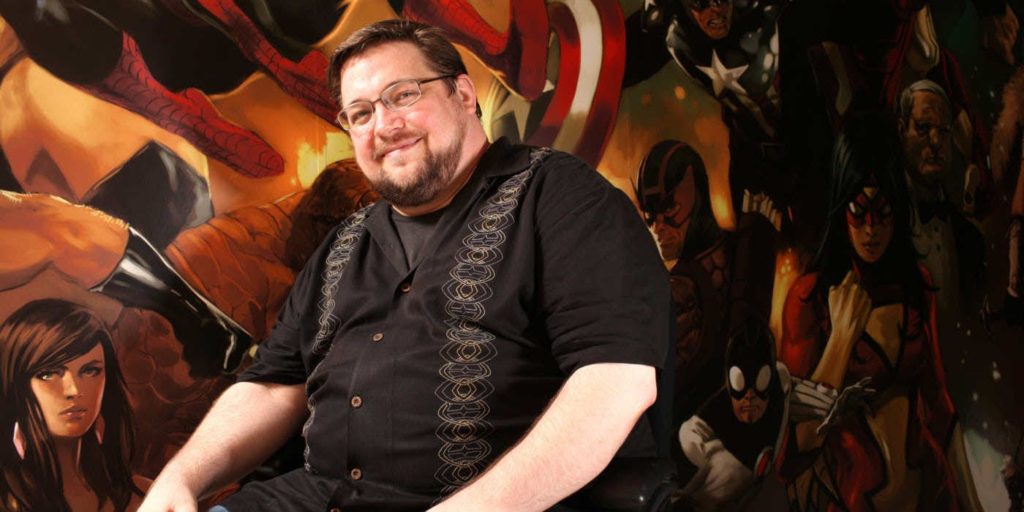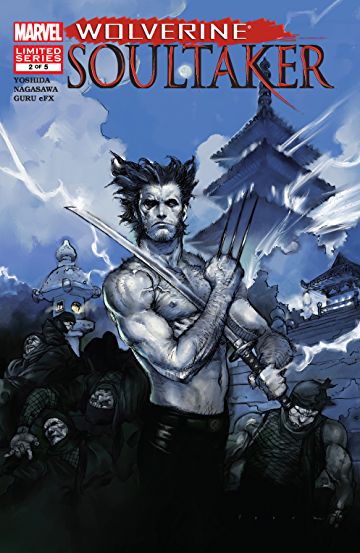
It’s a headline that might have described the antics in an episode of “Family Guy”: White guy pretends to be a Japanese guy to work as a comic book writer, and keeps the charade going for two years until he one day kills off his Asian altere-go when it outlived its usefulness. And, as with so many “Family Guy” subplots, the story has an overtly racist undertone.
No one would imagine that not only would this happen in real life, but that the White man in question would be named this year as Marvel Comics’ Editor-in-Chief — one of the top positions in the comic book industry. But yes, earlier last month, Bleeding Cool broke the news that newly-promoted Marvel Comics EIC C.B. Cebulski had spent two years between 2004 and 2005 writing several prominent Marvel titles under the invented guise of “Akira Yoshida”. Adding insult to injury, most of the stories written by Cebulski-as-Yoshida are Asiaphilic fables involving White protagonists immersed in the hyper-saturated colours of Orientalist fantasy.
For two years, Cebulski — a White man — donned literary yellowface to objectify, appropriate, commodify, and caricature all things Japanese for non-Asian comic book audiences. In so doing, Cebulski displaced actual Asian American comic book writers who still struggle to break into an industry that is an estimated 79% White and mostly men.

Contrary to what Cebulski’s supporters might say, this is not a simple case of a writer choosing a harmless pseudonym to camoflauge his real identity. This is not just any other pen name. Cebulski went far above-and-beyond the usual practice of a writer adopting a nom de plume; he invested significant effort into passing himself off as Yoshida, a real living breathing Japanese person. Akira Yoshida was not just a name. Akira Yoshida was an Asian skin that C.B. Cebulski wore for two years to earn himself fame and fortune as a prominent comic book writer.
To sell the charade, Cebulski took great pain to invent an elaborate backstory for Yoshida, and used his identity as Cebulski to vouch for his pen name. He even brought a Japanese translator to Marvel headquarters and introduced him as Yoshida. For years, people believed Yoshida was a real person. Cebulski even took interviews as Yoshida, describing himself as the son of an international businessman who had spent time in both America and Japan, who had previous experience in Japanese manga publishing houses, and who could help Marvel comics capitalize on the growing popularity of Japanese manga.
Cebulski deliberately chose the identity of “Akira Yoshida” so that he might obscure his own Whiteness and falsely present himself as a person of colour. He did this to assert that he had both the cultural and linguistic expertise and — more importantly — the racial authority to write about White heroes playing at bushido and ninjutsu; it is this latter, utterly false assertion that most offends. As Yoshida, Cebulski authored several miniseries arcs featuring some of Marvel’s most popular characters, including Kitty Pryde: Shadow & Flame (Kitty Pryde travels to Japan and battles ninjas!); Wolverine: Soultaker (Wolverine travels to Japan and battles ninjas!); and Elektra: The Hand (the origin story of a clandestine group of evil ninjas!) Are we sensing a stereotype-riddled, Orientalist trend in Cebulski’s Asiaphilic story pitches?
Cebulski may speak Japanese fluently and he may have a deep fascination with all things Ancient Japanese, but he does now know what it is like to be an actual Japanese or Japanese American person. He has cherrypicked elements of the Japanese and Japanese American experience — selecting the exotic stories of ninja and samurai while conveniently sidestepping the shared history of American imperialism, racist violence, and forcible incarceration. Japanese history, language, and culture is not for Cebulski to take and reinterpret for consumption by non-Asian comic book audiences; and yet, Cebulski asserted his entitlement over that history, language, and culture when he adopted an Asian identity to give himself the authority to take it and give it away to others.
Frankly, we should call it like it is: Cebulski is a common Asiaphile. In 2004, Cebulski-as-Yoshida told Newsarama:
My version of The Hand is greatly influenced by my love of Japanese history, [Akira] Kurosawa movies, and samurai manga, like Lone Wolf and Cub, Blade of the Immortal, and even Naruto.
Cebulski’s antics are a blatant example of a White man committing literary yellowface — the colonization of Asian identity for personal profit — but they are hardly the first. History abounds with stories of White men who pretend to be Asian to evoke a fake Asian mystique for White audiences. The Atlantic reminds of 18th century author George Psalmanazar who pretended to be from Taiwan for a fake book of cultural anthropology on Taiwanese people, and of the poet Araki Yasusada who is suspected to be a pseudonym taken by a White man. In the 19th century, false Chinese stage personas were vogue for White magicians: William Ellsworth Robinson donned yellowface as Chung Ling Soo (a name drawn from that of an actual Chinese magician whose act Robinson also stole) and spoke nonsense “Chinese” on- and off-stage to sell the part; Robinson was eventually killed on-stage when he accidentally botched one of his magic tricks. In 2015, poet Michel Derrick Hudson (another White man) submitted poems to the Best American Poetry anthology under the identity of Chinese poet Yi-Fen Chou. As Salon writer Paula Lee notes:
There is no precise term for Hudson’s ruse, which goes beyond the time-honored literary practice of adopting a pseudonym, which frequently included the subterfuge of changing one’s literary gender. George Sand, George Orwell, and George Eliot were all nom de plumes, and two of these Georges were female. Adding a racial component is something different, especially when the pseudonym is an explicit signifier of minority status and claims the marginalized position of the female poet of color (“Yi-Fen” is a woman’s name).
It is unclear how much money Cebulski made with his racial masquerade, but clearly he earned some: the Yoshida identity was invented to circumvent Marvel’s rule against staff writing comics for the publishing house. Cebulski created the Yoshida pen name so that he could keep his position as Associate Editor while writing comics. Beyond the racial hijincks, we should consider the ethical problems: Cebulski wrote comics that he was empowered to push through the editing process, either directly or through his professional connections at Marvel headquarters. That Cebulski’s Yoshida alter-ego — a supposed comic writing newcomer — was immediately charged with Marvel’s most valuable properties suggest that Cebulski exerted editorial influence to selectively promote his own creative work over the work of other writers.
This is the man whom Marvel Comics promoted to the role of Editor-in-Chief last month; and this is the man for whom Marvel has since offered their unwavering tacit defense. Marvel has not provided any commentary on Cebulski since Bleeding Cool broke the news of his literary yellowface, and Cebulski’s new job does not appear to be in question.
In The Atlantic last week, Cebulski finally offered an “apology” — his first public comment on the subject of Akira Yoshida:
I’m truly sorry for the pain, anger, and disappointment I caused over my poor choice of pseudonym. That was never my intention. Throughout my career in anime, manga, and comics, I’ve made it a point to listen and learn from my mistakes, which is exactly what I’ve been trying to do with this misstep. Building honest relationships with creators has always been important to me, and I’ve continued to do that in my new position. I’ve spoken with talent close to this issue, and have had candid and productive conversations about how we can improve the industry and build better stories, while being mindful of the voices behind them. My passion has always been about bringing the best talent from across the world to work on the best stories in the world, and I’m hopeful that fans and creators alike will join us in that continued mission.
This apology is utter bullshit. Nowhere does Cebulski acknowledge the problematic racial connotations of his Akira Yoshida psuedonym. Instead, Cebulski characterizes what he did as “a poor choice of pseudonym” — and not the donning of literary yellowface to authenticate cultural appropriation and heavy-handed Orientalist stereotyping. Cebulski then lays the responsibility of his education and healing squarely at the feet of others — presumably other people of colour. Cebulski does not offer steps towards personal accountability; instead, he suggests that the fault lies with the comic book industry, which he seeks to “improve”. Cebulski suggests that part of this improvement will be to recruit new creators, but Cebulski doesn’t explain who those new creators would be if they would help address his past. Most frustratingly, Cebulski never acknowledges that by donning the Akira Yoshida pseudonym, he pushed out creators of colour at a time when Marvel was actively seeking to recruit them.
How can it possibly be that — nearly a month after this story broke — this man is still Marvel Comics’ Editor-in-Chief? How can there be no official statement from Marvel yet on this story, and does their silence constitute a tacit condoning of Cebulski’s actions? How can there have been no sanction for this amoral, unethical, and racist act of literary yellowface? How can Asian American comic readers interpret this as anything but a slap in the face?
I was quoted in The Washington Post with some choice words for this whole story. “Screw this guy,” I said in a tweet I never expected would be quoted in a major newspaper of high repute. (Ooops.)
And, y’know what? I totally stand by that sentiment.
Asian American comic readers deserve better than the weak-ass apology Cebulski offered to The Atlantic last week. First of all, we deserve the courtesy of being addressed directly for our concerns. Second, the Asian American community deserves a real and sincere accounting for this racist yellowface; and, in my opinion, that starts with Cebulski’s immediate resignation from the position of Marvel’s Editor-in-Chief.
Third, Marvel Comics should immediately and publicly commit to hiring a bunch of new Asian American writers. It’s 2017 — how is the comic industry still so disproportionately and overwhelmingly dominated by White men creators?
